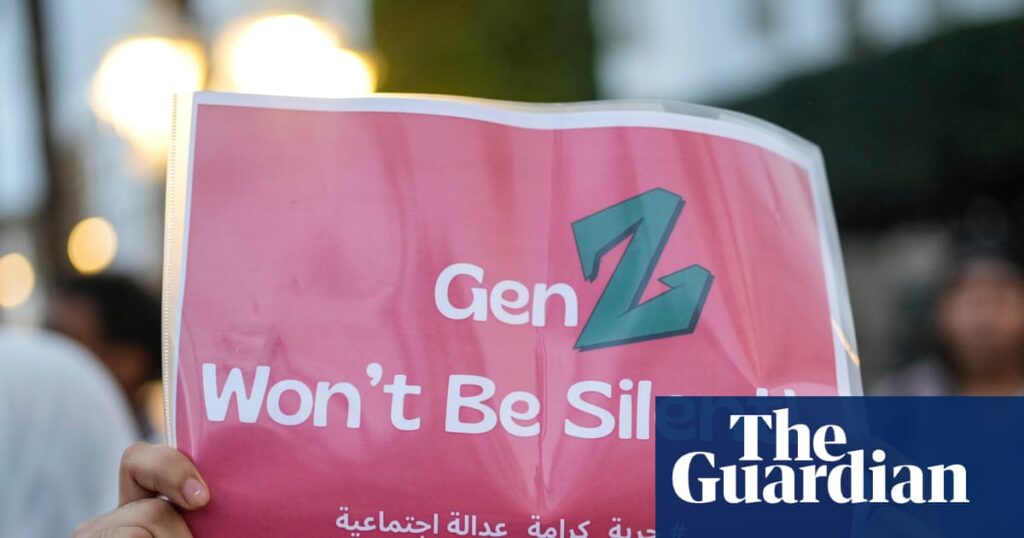Ayoub Oubalat shares a picture of what he says is his younger brother covered with a white blanket. The man’s eyes are closed and his left eye is bruised blue. At the crown of his head a hole is visible within his dark curly hair, the entry point where the bullet pierced, now shaved and stitched with blue and black thread.
A recently graduated film-maker, Abdessamade, 24, and two others were allegedly killed on 1 October when security forces opened fire on protesters in the town of Lqliâa, near the Atlantic coastal town of Agadir.
Authorities claim Abdessamade was part of a group that violently stormed the local police station, to which officers responded with fire. But Ayoub says his brother was a “peaceful man” who had found himself near the protests and spontaneously started filming.
Ayoub says his brother had actually applied to join the police force just two days before his death. “He wanted to serve his country, and needed a stable job to buy new equipment for his films.”
The death is one of three reported as a wave of youth-led Gen Z protests has gripped Morocco over the past fortnight.
Protesters have criticised the underfunding of healthcare and education facilities amid spending on expensive stadiums as the country gears up to co-host the 2030 Fifa World Cup.
The GenZ 212 protests, named after Morocco’s international dialling code, have been met with a strong response from police, with reports of more than 500 arrests made within the first six days.
In a speech to parliament last Friday, King Mohammed VI called for rapid social reforms, but did not address the protesters’ specific demands to tackle corruption and release activists.
Some of the leaderless protesters have organised themselves through the online gaming chat platform Discord, echoing similar digital mobilisations and mass youth protests seen in Nepal and Madagascar.
The GenZ 212 channel on Discord now counts more than 200,000 subscribers and along with other social media has amplified the call for a transparent investigation into Abdessamade’s death.
Salaheddine Lemaizi is editor-in-chief of the Moroccan media outlet Enass, which has been covering the Gen Z-led protests across the country. “We are still waiting for updated figures, but a document compiled by Moroccan lawyers shows that in the first six days of protest, more than 500 people were arrested. Of these, we know 272 remain in detention, including 36 minors, while 221 have been released pending trial.”
“Some youth did engage in violence, but the majority detained were peaceful demonstrators or bystanders. These mass arrests are clearly aimed at suppressing youth activism and criminalising protest. We’re already seeing harsh sentences: three, four, even 10 years in some cases,” says Lemaizi.
Lemaizi says most protesters still facing trial are accused of participating in unlawful demonstrations, charges that carry sentences of three to six months in prison.
Mustapha*, 22, was among those arrested and says he now faces up to six months in prison. “I went to protest because I’ve seen government violence all my life; not physical, but psychological. In hospitals, there are no doctors. In schools, classrooms are packed with over 50 students.”
He says he was detained on the second day of protests and was not allowed to call his family or speak to a lawyer during 48 hours in detention.
“My friend spoke to the press and was arrested immediately. I tried to walk away but a plainclothes officer arrested me. They forced us to sign papers admitting we took part in illegal protests.”
The Moroccan rapper Hamza Raid has become one of the most high-profile figures arrested and faces a potential prison sentence for allegedly participating in the protests and allegedly inciting crimes online. His viral song Kifa7i (My Struggle) has more than 10m YouTube views and he is known for addressing social injustice.
Across Discord and other social media platforms, the hashtag #FreeKoulchi, meaning “free everyone” in Moroccan Arabic, has become a rallying cry for those still waiting for their loved ones’ release.
In response to the mass arrests, the president of the Moroccan Organisation for Human Rights (OMDH) has said the freedom to demonstrate peacefully is a fundamental right, enshrined in the constitution and international conventions. It called on authorities to end legal proceedings against GenZ 212 protesters, release detainees and guarantee fair trials for those still facing charges.
The prime minister, Aziz Akhannouch, has said the government is “ready for dialogue and discussion”. Last night, however, GenZ organisers announced on Discord and their official social media platforms that protests will be held October 18.
Salma, 29, who has already taken to the streets in Casablanca to support GenZ, says: “This generation is defiant even as they come to face the political reality of Morocco. The crackdown will not calm them down”
* Names have been changed

